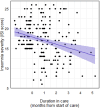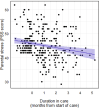Sleep problems and parental stress among caregivers of children and adolescents enrolled in a digital mental health intervention
- PMID: 39816884
- PMCID: PMC11731620
- DOI: 10.3389/frcha.2023.1265095
Sleep problems and parental stress among caregivers of children and adolescents enrolled in a digital mental health intervention
Abstract
Introduction: Caregivers of children with mental health problems such as anxiety, depression, and attention-deficit/hyperactivity disorder often experience heightened sleep problems, largely due to their children's disrupted sleep, and increased parental stress. Evidence suggests that mental and behavioral health care for children and adolescents has the potential to positively affect their caregivers; however, this has not been investigated in the context of pediatric digital mental health interventions (DMHIs). Therefore, the current study used caregivers' self-report measures to determine whether caregivers whose children are involved in a DMHI exhibit improvements in sleep problems and parental stress after initiation of their children's care.
Methods: Caregivers with a child or adolescent participating in behavioral coaching and/or therapy with Bend Health Inc., a pediatric DMHI that involves both the child and caregiver in care (e.g., coaching and therapy), were included in the study (n = 662). Caregiver insomnia severity and parental stress were reported approximately every 30 days using the Insomnia Severity Index (ISI) and Parental Stress Scale (PSS). Changes in symptoms were assessed by comparing caregivers' symptom scores from baseline to first assessment after starting care.
Results: Among caregivers with elevated insomnia severity (n = 88) and parental stress (n = 119) at baseline, 77% showed improvements in sleep and 73% showed improvements in parental stress after the initiation of their child's care, with significant decreases in score from baseline to post-care (ISI: t 72 = -4.83, P < .001, d = 0.61; PSS: Z = -4.98, P < .001, d = 0.59).
Discussion: While extant research suggests ongoing links between child behavioral problems, parent sleep, and parent well-being, this is the first study to demonstrate improvements in caregiver sleep and stress when a child's mental health symptoms are addressed with behavioral care. Our findings offer promising preliminary evidence that caregivers experience significant secondary benefits to their sleep and parental stress when their children participate in a pediatric DMHI. Further research is warranted to investigate additional moderating and mediating factors, such as caregiver demographics and magnitude of child mental health improvement.
Keywords: family-based care; insomnia symptoms; online coaching; online therapy; pediatrics; telehealth.
© 2023 Huffman, Lawrence-Sidebottom, Huberty, Guerra, Roots, Roots and Parikh.
Conflict of interest statement
All authors are employed or contracted with Bend Health Inc., which delivered the treatment used in this retrospective study. However, authors’ employment status and salary are not dependent upon the results of their research. Author JH was employed by FitMinded, Inc.
Figures




References
-
- Theule J, Wiener J, Tannock R, Jenkins JM. Parenting stress in families of children with ADHD: a meta-analysis. J Emot Behav Disord. (2013) 21(1):3–17. 10.1177/1063426610387433 - DOI
LinkOut - more resources
Full Text Sources

